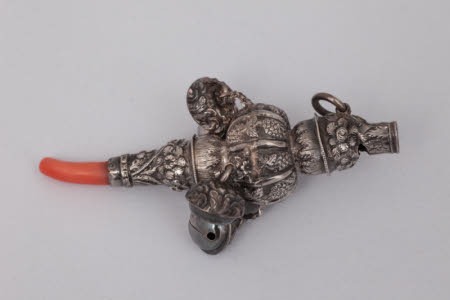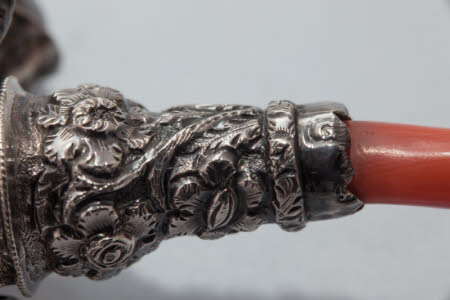Teething coral
Category
Silver
Date
circa 1825
Materials
Silver
Measurements
50 mm (Width); 9.4 cm (Length)
Order this imageCollection
Ickworth, Suffolk
NT 852799
Caption
For millennia, coral has been used as a charm against evil as well as to alleviate pain during teething. The ancient Greeks hung coral ornaments on baby cradles and ancient Romans made coral necklaces for their children to ward off evil influences. This superstition persisted into the medieval period, when families who could afford it gave their babies coral sticks for their delicate gums. Because coral hardens when it is taken out of the sea, it was believed to have a hardening effect on children's teeth. This baby teether and rattle consists of a whistle and bells at one end and a teething coral at the other. It was made by George Knight, one of the principal producers of such pieces in the Regency era. It was probably acquired for the children of Frederick Hervey, Earl Jermyn (subsequently 2nd Marquess), the first of whom, Lady Elizabeth Hervey, was born in 1832.
Summary
Teething coral. George Knight, London, c.1825. The bulbous body is raised in two parts and seamed and is chased in segments with the leaves and fruit of strawberries. At one end is a lambrequin collar and a hemispherical cap with foliate chasing above which is a circular whistle and at the other end is a tapering, seamed stem chased with strawberry flowers and holding a piece of coral. Attached to the sides of the body by chain links are four hemispherical, chased bells. A ring for a lace is attached to the underside of the whistle.
Provenance
Probably Frederick Hervey, Earl Jermyn (subsequently 2nd Marquess of Bristol); by descent to the 4th Marquess. Acquired by the National Trust in 1956 under the auspices of the National Land Fund, later the National Heritage Memorial Fund.
References
James Rothwell, Silver for Entertaining: The Ickworth Collection. Philip Wilson Publishers, 2016, p. 218

